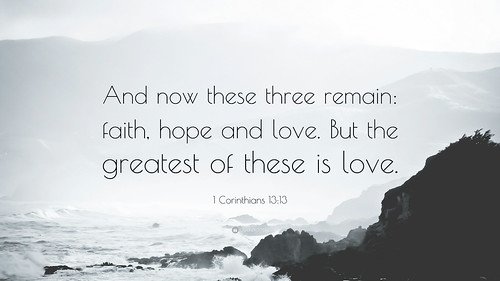1 Therefore, since we have been justified by faith, we have peace with God through our Lord Jesus Christ,
2 through whom we have gained access [by faith] to this grace in which we stand, and we boast in hope of the glory of God.
3 Not only that, but we even boast of our afflictions, knowing that affliction produces endurance,
4 and endurance, proven character, and proven character, hope,
5 and hope does not disappoint, because the love of God has been poured out into our hearts through the holy Spirit that has been given to us.
6 For Christ, while we were still helpless, yet died at the appointed time for the ungodly.
7 Indeed, only with difficulty does one die for a just person, though perhaps for a good person one might even find courage to die.
8 But God proves his love for us in that while we were still sinners Christ died for us.
9 How much more then, since we are now justified by his blood, will we be saved through him from the wrath.
10 Indeed, if, while we were enemies, we were reconciled to God through the death of his Son, how much more, once reconciled, will we be saved by his life.
11 Not only that, but we also boast of God through our Lord Jesus Christ, through whom we have now received reconciliation.
12 Therefore, just as through one person sin entered the world, and through sin, death, and thus death came to all, inasmuch as all sinned
13 for up to the time of the law, sin was in the world, though sin is not accounted when there is no law.
14 But death reigned from Adam to Moses, even over those who did not sin after the pattern of the trespass of Adam, who is the type of the one who was to come.
15 But the gift is not like the transgression. For if by that one person’s transgression the many died, how much more did the grace of God and the gracious gift of the one person Jesus Christ overflow for the many.
16 And the gift is not like the result of the one person’s sinning. For after one sin there was the judgment that brought condemnation; but the gift, after many transgressions, brought acquittal.
17 For if, by the transgression of one person, death came to reign through that one, how much more will those who receive the abundance of grace and of the gift of justification come to reign in life through the one person Jesus Christ.
18 In conclusion, just as through one transgression condemnation came upon all, so through one righteous act acquittal and life came to all.
19 For just as through the disobedience of one person the many were made sinners, so through the obedience of one the many will be made righteous.
20 The law entered in so that transgression might increase but, where sin increased, grace overflowed all the more,
21 so that, as sin reigned in death, grace also might reign through justification for eternal life through Jesus Christ our Lord.
Romans, chapter 5
attribution: Amydeanne and flickr




